Accommodation · Africa · Hotels · Regions · Resorts · South Africa
6 outstanding eco-lodges in South Africa
As travellers we are all more aware than ever of our environmental impact and want to make choices that will help preserve and protect the places we visit.
Safari lodges and nature camps are essentially very eco-friendly, and without them (and tourists they attract) far less land would be set aside for conservation and the protection of Africa’s landscapes and wildlife. Permanent structures are not allowed in more sensitive habitats, meaning that many lodges and camps can be taken apart and moved to another location allow the land to recover, and even in instances where permanent buildings are used these tend to use solar energy to reduce their impact on the environment.
These lodges also strive to be socially responsible and are committed to uplifting their local communities by supporting their businesses, contributing to education and healthcare projects in the area, and creating greater awareness of conservation issues.
South Africa is one of the most biodiverse countries on earth, and we have chosen a few great examples of our favourite lodges that are inspiring others in their approach of balancing luxury travel and eco-tourism.
Tswalu Kalahari Reserve
Tswalu Kalahari is South Africa’s largest privately owned game reserve (100,000 hectares), and is situated in the heart of the Northern Cape Province. The reserve offers excellent game-viewing of desert-adapted animal species such as desert black rhino, black-maned kalahari lion and loveable meerkats. Guided walks, private vehicles, horse-back safaris and hot air ballooning are all available as are nights sleeping out under Africa’s biggest skies.
 Tswalu Kalahari was created as a conservation project to rehabilitate and restore the natural environment from previously farmed land. The reserve is designed to support research projects, such as studying the impact of climate change on endangered species, and a number of community projects including the Tswalu Healthcare Centre, small scale horticulture and a school project.
In combination with their main focus being conservation, the reserve offers an exclusive safari experience with 2 intimate, luxury lodges, built from organic materials. The lodges create employment opportunities for the local community, teach awareness to their guests and with a variety of game species on the reserve, Tswalu is a perfect example of excellent eco-tourism.
Grootbos Private Nature Reserve
This five-star eco-lodge reserve is perfectly located amongst indigenous fynbos, milkwood forests and beside the picturesque Atlantic Ocean. Guests here can take a quiet walk through the ancient forest, or explore this natural wonderland by 4-wheel drive vehicle, or enjoy the views from horseback on a guided ride. Bird lovers will delight in the large number of different bird species that are found in the reserve, and there are other activities such as shark cage diving, scenic flights, exploring archaeological caves and whale watching.
Tswalu Kalahari was created as a conservation project to rehabilitate and restore the natural environment from previously farmed land. The reserve is designed to support research projects, such as studying the impact of climate change on endangered species, and a number of community projects including the Tswalu Healthcare Centre, small scale horticulture and a school project.
In combination with their main focus being conservation, the reserve offers an exclusive safari experience with 2 intimate, luxury lodges, built from organic materials. The lodges create employment opportunities for the local community, teach awareness to their guests and with a variety of game species on the reserve, Tswalu is a perfect example of excellent eco-tourism.
Grootbos Private Nature Reserve
This five-star eco-lodge reserve is perfectly located amongst indigenous fynbos, milkwood forests and beside the picturesque Atlantic Ocean. Guests here can take a quiet walk through the ancient forest, or explore this natural wonderland by 4-wheel drive vehicle, or enjoy the views from horseback on a guided ride. Bird lovers will delight in the large number of different bird species that are found in the reserve, and there are other activities such as shark cage diving, scenic flights, exploring archaeological caves and whale watching.
 Grootbos is one of the world leaders in luxury eco-tourism, ensuring preservation for their wildlife and flora, guest involvement and awareness through shared knowledge. The reserve has also created several projects that not only uplift their local community and preserve their environment but they have also created a foundation to help other hospitality businesses to start their own ‘green initiatives’.
Umlani Bushcamp
Umlani Bushcamp is a classic African safari camp located in the Timbavati Private Nature Reserve, which forms part of the Greater Kruger National Park. The camp offers an authentic wildlife experience in Big 5 territory. View lion, leopard, elephant, buffalo and rhino, as well as over 40 other mammal species and 350 bird species.
Grootbos is one of the world leaders in luxury eco-tourism, ensuring preservation for their wildlife and flora, guest involvement and awareness through shared knowledge. The reserve has also created several projects that not only uplift their local community and preserve their environment but they have also created a foundation to help other hospitality businesses to start their own ‘green initiatives’.
Umlani Bushcamp
Umlani Bushcamp is a classic African safari camp located in the Timbavati Private Nature Reserve, which forms part of the Greater Kruger National Park. The camp offers an authentic wildlife experience in Big 5 territory. View lion, leopard, elephant, buffalo and rhino, as well as over 40 other mammal species and 350 bird species.
 This is a very popular lodge for visitors as it offers a strong sense of African charm in its guest experience. The lodge’s efforts to be more eco-conscious add to the adventure for the guests, while ensuring they are doing their bit to run a sustainable eco-friendly lodge.
The lodge is powered by solar energy and the guest huts are lit by candlelight and oil lamps. All food produce is locally sourced and effective water savings methods are implemented. Non-toxic and biodegradable cleaning products are used exclusively at the lodge, and all waste is recyled with organic waste being composted on-site. The lodge is certified by Fair Trade Tourism, and in addition to supporting local education and training inititives, the lodge runs run in-house Ranger and Tracker Apprentice programme. 80% of the staff at Umlani come from the local community, and their commitment to training staff so they can grow and develop their careers means that there are several people who started as apprentices at Umlani whoe are now working as rangers, trackers, chefs and in management at other neighbouring lodges.
Thonga Beach Lodge
Located in the iSimangaliso Wetland Park, an internationally recognised World Heritage Site, the lodge is surrounded by coastal forests, South Africa’s largest fresh water lake, pristine beaches and clear warm water with abundant marine life – creating the perfect haven for nature enthusiasts and those who want to explore somewhere untouched, offering privacy and tranquillity with minimal environmental impact.
This is a very popular lodge for visitors as it offers a strong sense of African charm in its guest experience. The lodge’s efforts to be more eco-conscious add to the adventure for the guests, while ensuring they are doing their bit to run a sustainable eco-friendly lodge.
The lodge is powered by solar energy and the guest huts are lit by candlelight and oil lamps. All food produce is locally sourced and effective water savings methods are implemented. Non-toxic and biodegradable cleaning products are used exclusively at the lodge, and all waste is recyled with organic waste being composted on-site. The lodge is certified by Fair Trade Tourism, and in addition to supporting local education and training inititives, the lodge runs run in-house Ranger and Tracker Apprentice programme. 80% of the staff at Umlani come from the local community, and their commitment to training staff so they can grow and develop their careers means that there are several people who started as apprentices at Umlani whoe are now working as rangers, trackers, chefs and in management at other neighbouring lodges.
Thonga Beach Lodge
Located in the iSimangaliso Wetland Park, an internationally recognised World Heritage Site, the lodge is surrounded by coastal forests, South Africa’s largest fresh water lake, pristine beaches and clear warm water with abundant marine life – creating the perfect haven for nature enthusiasts and those who want to explore somewhere untouched, offering privacy and tranquillity with minimal environmental impact.
 The driving force behind this lodge is to ensure that each decision is made ethically and with the natural environment in mind. Be it small touches such as reusable water bottles or sustainably sourced seafood for their guests, to bigger projects that include creating micro economies for their neighbouring communities or the turtle tracking and research initiatives – Thonga Beach Lodge is a front runner in balancing luxury with eco-tourism.
Sibuya Game Reserve
The only game reserve in South Africa that is solely accessed by boat, having more navigable river. Located in the malaria free Eastern Cape, Sibuya offers an abundance of diverse wildlife, including the Big 5. Their two Eco-destination lodges – Forest and River Camp – are both being run almost exclusively on Solar Power.
The driving force behind this lodge is to ensure that each decision is made ethically and with the natural environment in mind. Be it small touches such as reusable water bottles or sustainably sourced seafood for their guests, to bigger projects that include creating micro economies for their neighbouring communities or the turtle tracking and research initiatives – Thonga Beach Lodge is a front runner in balancing luxury with eco-tourism.
Sibuya Game Reserve
The only game reserve in South Africa that is solely accessed by boat, having more navigable river. Located in the malaria free Eastern Cape, Sibuya offers an abundance of diverse wildlife, including the Big 5. Their two Eco-destination lodges – Forest and River Camp – are both being run almost exclusively on Solar Power.
 This is where you go to disconnect (literally as there is no wi-fi, air-con, fans or hair dryers) and absorb yourself in nature. The reserves offers many ways in which they are giving back, including: Volunteer programmes that assist in the involvement of research, wildlife tracking, anti-poaching support and area maintenance. Their staff are recruited and trained from the local community, they obtain locally sourced produce for their kitchens and utilize on site recycling and composting. The team also literally get their hands dirty with regular river clean ups. This really is a very special and unique safari experience, with a wonderful emphasis on conservation and eco-tourism.
Makanyi Private Game Lodge
Even in otherwise eco-friendly lodges, the majority of game drive activities are still conducted in traditional petrol or diesel vehicles. Makanyi Private Game Lodge, in Timvabati, has become among one of the first game lodges to introduce the new breed of electric vehicles for game drives. The vehicles are recharged from solar panels and a full charge lasts around 6 hours on average, which equates to between 150 km and 200 km depending on the terrain….way more than would ever be needed on any game drive.
This is where you go to disconnect (literally as there is no wi-fi, air-con, fans or hair dryers) and absorb yourself in nature. The reserves offers many ways in which they are giving back, including: Volunteer programmes that assist in the involvement of research, wildlife tracking, anti-poaching support and area maintenance. Their staff are recruited and trained from the local community, they obtain locally sourced produce for their kitchens and utilize on site recycling and composting. The team also literally get their hands dirty with regular river clean ups. This really is a very special and unique safari experience, with a wonderful emphasis on conservation and eco-tourism.
Makanyi Private Game Lodge
Even in otherwise eco-friendly lodges, the majority of game drive activities are still conducted in traditional petrol or diesel vehicles. Makanyi Private Game Lodge, in Timvabati, has become among one of the first game lodges to introduce the new breed of electric vehicles for game drives. The vehicles are recharged from solar panels and a full charge lasts around 6 hours on average, which equates to between 150 km and 200 km depending on the terrain….way more than would ever be needed on any game drive.
 In addition to the environmental benefits, there are a number of advantages to electric vehicles for guests. The absence of engine noise means that you can hear more of the sounds of the bush around you, and your guide will be better able follow animals who might have otherwise been spooked by the sound of the engine. The smooth drive of the vehicles will also provide a better platform for taking photos and videos to capture scenes without the vibration and noise from the engine.
Paul Campbell is a Co-founder and Managing Director at Travel Butlers. Travel Butlers are specialists in tailor-made safari and beach holidays to Africa and the Indian Ocean.
If you would like to be a guest blogger on A Luxury Travel Blog in order to raise your profile, please contact us.
In addition to the environmental benefits, there are a number of advantages to electric vehicles for guests. The absence of engine noise means that you can hear more of the sounds of the bush around you, and your guide will be better able follow animals who might have otherwise been spooked by the sound of the engine. The smooth drive of the vehicles will also provide a better platform for taking photos and videos to capture scenes without the vibration and noise from the engine.
Paul Campbell is a Co-founder and Managing Director at Travel Butlers. Travel Butlers are specialists in tailor-made safari and beach holidays to Africa and the Indian Ocean.
If you would like to be a guest blogger on A Luxury Travel Blog in order to raise your profile, please contact us.
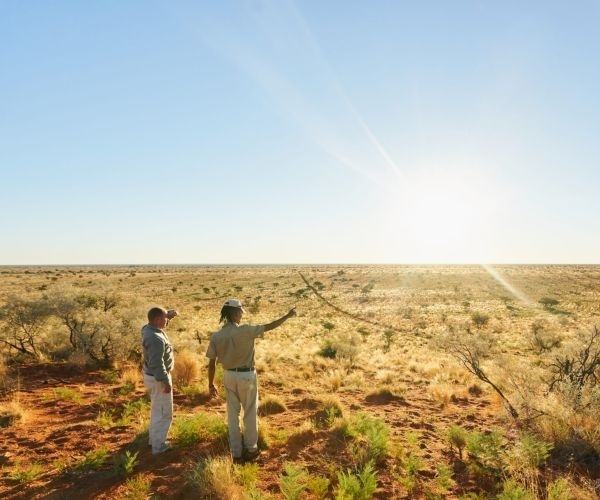 Tswalu Kalahari was created as a conservation project to rehabilitate and restore the natural environment from previously farmed land. The reserve is designed to support research projects, such as studying the impact of climate change on endangered species, and a number of community projects including the Tswalu Healthcare Centre, small scale horticulture and a school project.
In combination with their main focus being conservation, the reserve offers an exclusive safari experience with 2 intimate, luxury lodges, built from organic materials. The lodges create employment opportunities for the local community, teach awareness to their guests and with a variety of game species on the reserve, Tswalu is a perfect example of excellent eco-tourism.
Grootbos Private Nature Reserve
This five-star eco-lodge reserve is perfectly located amongst indigenous fynbos, milkwood forests and beside the picturesque Atlantic Ocean. Guests here can take a quiet walk through the ancient forest, or explore this natural wonderland by 4-wheel drive vehicle, or enjoy the views from horseback on a guided ride. Bird lovers will delight in the large number of different bird species that are found in the reserve, and there are other activities such as shark cage diving, scenic flights, exploring archaeological caves and whale watching.
Tswalu Kalahari was created as a conservation project to rehabilitate and restore the natural environment from previously farmed land. The reserve is designed to support research projects, such as studying the impact of climate change on endangered species, and a number of community projects including the Tswalu Healthcare Centre, small scale horticulture and a school project.
In combination with their main focus being conservation, the reserve offers an exclusive safari experience with 2 intimate, luxury lodges, built from organic materials. The lodges create employment opportunities for the local community, teach awareness to their guests and with a variety of game species on the reserve, Tswalu is a perfect example of excellent eco-tourism.
Grootbos Private Nature Reserve
This five-star eco-lodge reserve is perfectly located amongst indigenous fynbos, milkwood forests and beside the picturesque Atlantic Ocean. Guests here can take a quiet walk through the ancient forest, or explore this natural wonderland by 4-wheel drive vehicle, or enjoy the views from horseback on a guided ride. Bird lovers will delight in the large number of different bird species that are found in the reserve, and there are other activities such as shark cage diving, scenic flights, exploring archaeological caves and whale watching.
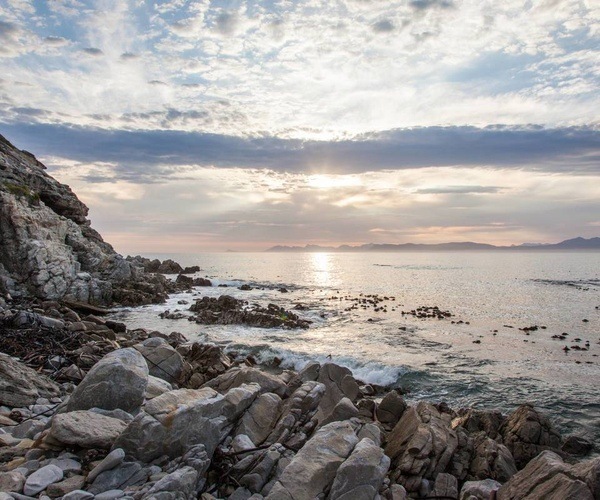 Grootbos is one of the world leaders in luxury eco-tourism, ensuring preservation for their wildlife and flora, guest involvement and awareness through shared knowledge. The reserve has also created several projects that not only uplift their local community and preserve their environment but they have also created a foundation to help other hospitality businesses to start their own ‘green initiatives’.
Umlani Bushcamp
Umlani Bushcamp is a classic African safari camp located in the Timbavati Private Nature Reserve, which forms part of the Greater Kruger National Park. The camp offers an authentic wildlife experience in Big 5 territory. View lion, leopard, elephant, buffalo and rhino, as well as over 40 other mammal species and 350 bird species.
Grootbos is one of the world leaders in luxury eco-tourism, ensuring preservation for their wildlife and flora, guest involvement and awareness through shared knowledge. The reserve has also created several projects that not only uplift their local community and preserve their environment but they have also created a foundation to help other hospitality businesses to start their own ‘green initiatives’.
Umlani Bushcamp
Umlani Bushcamp is a classic African safari camp located in the Timbavati Private Nature Reserve, which forms part of the Greater Kruger National Park. The camp offers an authentic wildlife experience in Big 5 territory. View lion, leopard, elephant, buffalo and rhino, as well as over 40 other mammal species and 350 bird species.
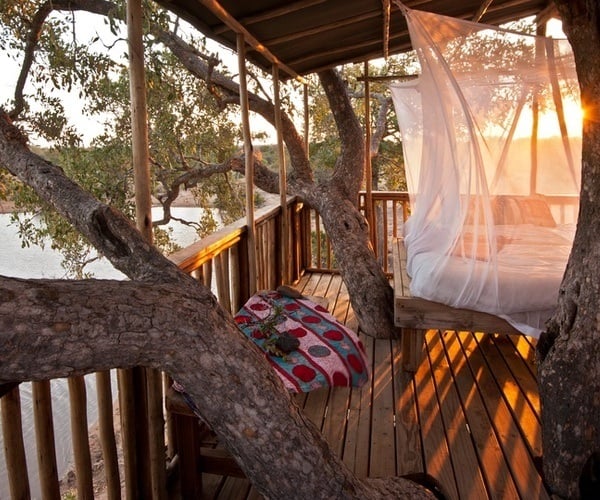 This is a very popular lodge for visitors as it offers a strong sense of African charm in its guest experience. The lodge’s efforts to be more eco-conscious add to the adventure for the guests, while ensuring they are doing their bit to run a sustainable eco-friendly lodge.
The lodge is powered by solar energy and the guest huts are lit by candlelight and oil lamps. All food produce is locally sourced and effective water savings methods are implemented. Non-toxic and biodegradable cleaning products are used exclusively at the lodge, and all waste is recyled with organic waste being composted on-site. The lodge is certified by Fair Trade Tourism, and in addition to supporting local education and training inititives, the lodge runs run in-house Ranger and Tracker Apprentice programme. 80% of the staff at Umlani come from the local community, and their commitment to training staff so they can grow and develop their careers means that there are several people who started as apprentices at Umlani whoe are now working as rangers, trackers, chefs and in management at other neighbouring lodges.
Thonga Beach Lodge
Located in the iSimangaliso Wetland Park, an internationally recognised World Heritage Site, the lodge is surrounded by coastal forests, South Africa’s largest fresh water lake, pristine beaches and clear warm water with abundant marine life – creating the perfect haven for nature enthusiasts and those who want to explore somewhere untouched, offering privacy and tranquillity with minimal environmental impact.
This is a very popular lodge for visitors as it offers a strong sense of African charm in its guest experience. The lodge’s efforts to be more eco-conscious add to the adventure for the guests, while ensuring they are doing their bit to run a sustainable eco-friendly lodge.
The lodge is powered by solar energy and the guest huts are lit by candlelight and oil lamps. All food produce is locally sourced and effective water savings methods are implemented. Non-toxic and biodegradable cleaning products are used exclusively at the lodge, and all waste is recyled with organic waste being composted on-site. The lodge is certified by Fair Trade Tourism, and in addition to supporting local education and training inititives, the lodge runs run in-house Ranger and Tracker Apprentice programme. 80% of the staff at Umlani come from the local community, and their commitment to training staff so they can grow and develop their careers means that there are several people who started as apprentices at Umlani whoe are now working as rangers, trackers, chefs and in management at other neighbouring lodges.
Thonga Beach Lodge
Located in the iSimangaliso Wetland Park, an internationally recognised World Heritage Site, the lodge is surrounded by coastal forests, South Africa’s largest fresh water lake, pristine beaches and clear warm water with abundant marine life – creating the perfect haven for nature enthusiasts and those who want to explore somewhere untouched, offering privacy and tranquillity with minimal environmental impact.
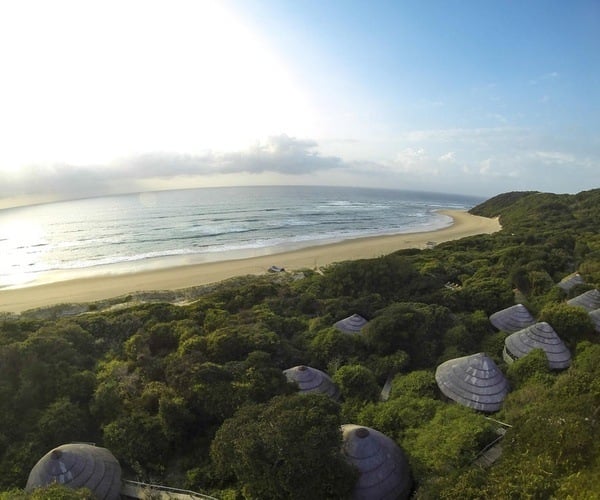 The driving force behind this lodge is to ensure that each decision is made ethically and with the natural environment in mind. Be it small touches such as reusable water bottles or sustainably sourced seafood for their guests, to bigger projects that include creating micro economies for their neighbouring communities or the turtle tracking and research initiatives – Thonga Beach Lodge is a front runner in balancing luxury with eco-tourism.
Sibuya Game Reserve
The only game reserve in South Africa that is solely accessed by boat, having more navigable river. Located in the malaria free Eastern Cape, Sibuya offers an abundance of diverse wildlife, including the Big 5. Their two Eco-destination lodges – Forest and River Camp – are both being run almost exclusively on Solar Power.
The driving force behind this lodge is to ensure that each decision is made ethically and with the natural environment in mind. Be it small touches such as reusable water bottles or sustainably sourced seafood for their guests, to bigger projects that include creating micro economies for their neighbouring communities or the turtle tracking and research initiatives – Thonga Beach Lodge is a front runner in balancing luxury with eco-tourism.
Sibuya Game Reserve
The only game reserve in South Africa that is solely accessed by boat, having more navigable river. Located in the malaria free Eastern Cape, Sibuya offers an abundance of diverse wildlife, including the Big 5. Their two Eco-destination lodges – Forest and River Camp – are both being run almost exclusively on Solar Power.
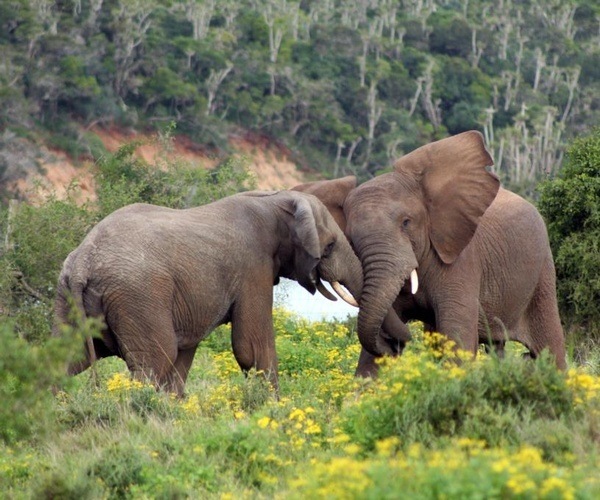 This is where you go to disconnect (literally as there is no wi-fi, air-con, fans or hair dryers) and absorb yourself in nature. The reserves offers many ways in which they are giving back, including: Volunteer programmes that assist in the involvement of research, wildlife tracking, anti-poaching support and area maintenance. Their staff are recruited and trained from the local community, they obtain locally sourced produce for their kitchens and utilize on site recycling and composting. The team also literally get their hands dirty with regular river clean ups. This really is a very special and unique safari experience, with a wonderful emphasis on conservation and eco-tourism.
Makanyi Private Game Lodge
Even in otherwise eco-friendly lodges, the majority of game drive activities are still conducted in traditional petrol or diesel vehicles. Makanyi Private Game Lodge, in Timvabati, has become among one of the first game lodges to introduce the new breed of electric vehicles for game drives. The vehicles are recharged from solar panels and a full charge lasts around 6 hours on average, which equates to between 150 km and 200 km depending on the terrain….way more than would ever be needed on any game drive.
This is where you go to disconnect (literally as there is no wi-fi, air-con, fans or hair dryers) and absorb yourself in nature. The reserves offers many ways in which they are giving back, including: Volunteer programmes that assist in the involvement of research, wildlife tracking, anti-poaching support and area maintenance. Their staff are recruited and trained from the local community, they obtain locally sourced produce for their kitchens and utilize on site recycling and composting. The team also literally get their hands dirty with regular river clean ups. This really is a very special and unique safari experience, with a wonderful emphasis on conservation and eco-tourism.
Makanyi Private Game Lodge
Even in otherwise eco-friendly lodges, the majority of game drive activities are still conducted in traditional petrol or diesel vehicles. Makanyi Private Game Lodge, in Timvabati, has become among one of the first game lodges to introduce the new breed of electric vehicles for game drives. The vehicles are recharged from solar panels and a full charge lasts around 6 hours on average, which equates to between 150 km and 200 km depending on the terrain….way more than would ever be needed on any game drive.
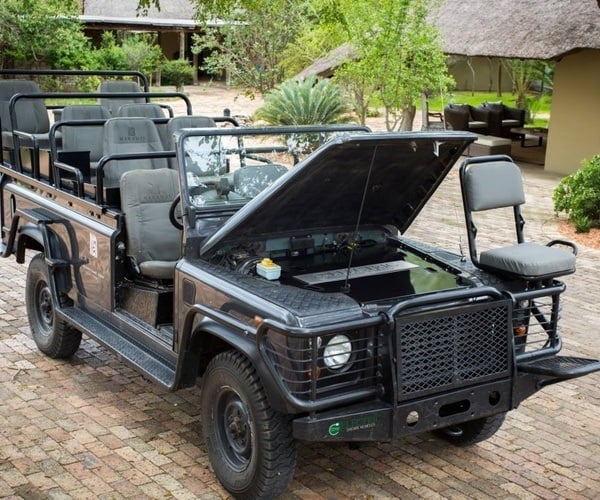 In addition to the environmental benefits, there are a number of advantages to electric vehicles for guests. The absence of engine noise means that you can hear more of the sounds of the bush around you, and your guide will be better able follow animals who might have otherwise been spooked by the sound of the engine. The smooth drive of the vehicles will also provide a better platform for taking photos and videos to capture scenes without the vibration and noise from the engine.
Paul Campbell is a Co-founder and Managing Director at Travel Butlers. Travel Butlers are specialists in tailor-made safari and beach holidays to Africa and the Indian Ocean.
If you would like to be a guest blogger on A Luxury Travel Blog in order to raise your profile, please contact us.
In addition to the environmental benefits, there are a number of advantages to electric vehicles for guests. The absence of engine noise means that you can hear more of the sounds of the bush around you, and your guide will be better able follow animals who might have otherwise been spooked by the sound of the engine. The smooth drive of the vehicles will also provide a better platform for taking photos and videos to capture scenes without the vibration and noise from the engine.
Paul Campbell is a Co-founder and Managing Director at Travel Butlers. Travel Butlers are specialists in tailor-made safari and beach holidays to Africa and the Indian Ocean.
If you would like to be a guest blogger on A Luxury Travel Blog in order to raise your profile, please contact us.Did you enjoy this article?
Receive similar content direct to your inbox.


Apart from the obvious reason of wildlife spotting one of my great reasons for visiting South Africa would be the Dark Skies. Since I was a small boy I have always been interested in astronomy. People who have been to Africa say that you get some astounding views of far more stars and constellations than you ever get in the Northern Hemisphere. Do any of these eco-lodges have telescopes and specialise in star-gazing?
Hi Vernon,
I think Tswalu Kalahari would be your best bet for stargazing from the lodges mentioned here – their location in the Southern Kalahari means there is very little light polutiion, and they have an advanced MEADE computerised mobile telescope (with 10x magnifying mirror and a range of eyepieces), and the guides are trained to help guests use this to explore the stars.
Happy stargazing!
Paul.
It is imperative that lodges in such fragile eco-systems as those in a game park are eco-lodges. Back in the 1980s I was shocked to see a dark plume of acrid black smoke climbing into a cloudless blue sky as I left a safari lodge. It was quite apparent back then that the lodge had no proper facilities for waste disposal and had no worries in bringing pollution to what was once a pristine environment. Fortunately most lodge operators are far more environmentally conscious nowadays.
Electric vehicles at Makanyi Private Game Lodge are a very positive step in the right direction. There’s nothing worse on a safari than seeing animals prick up their eyes when they hear the sound of a vehicle on its way. For me it just spoils the whole atmosphere. It’s such a great innovation and I hope that other lodges follow Makanyi’s example.
I am sure that electric vehicles will become more commonplace in southern Africa as the cost of converting petrol/diesel vehicle to electric starts to fall. Morning and evening games are an ideal use for electric vehicles, and there is a real guest benefit as well as an environmental benefit (and free recharging via solar panels!).
Unfortunately we may need to see further advances in battery technology before an electric vehicle might work with longer routes such as Tanzania’s northern circuit.
Thonga Beach Lodge is definitely worth the trip. You get to enjoy a different kind of African Safari and the beach in one location. Plus, being eco-friendly helps, since we all should be thinking about reusables and recycling. For couples, this is the perfect way to enjoy some privacy and also be active whenever the mood strikes.
I think it’s great there’s more awareness of eco friendly initiatives and more people are taking on board environmental factors when travelling. I don’t think it’s always easy to find which places have decent eco friendly credentials though, so posts like this are really helpful in giving suggestions of where to look. It’s brilliant places like Tswalu Kalahari are focusing on conservation and undertaking extra work like research and community projects. It’s more of a holistic approach to eco tourism, not just saying they have organic produce or use recycled materials for their buildings. They’re going the extra steps and boosting the local area with employment, too. I wish other places would be more considerate of the need to look at it in a more broad way like this.
Hi Amy,
Thanks for your feedback, and you are right to call it a more holistic approach – I wish I had thought to use that term as it perfectly captures what these lodges are looking to achieve.
Paul.
In that case it just shows that you described it to us perfectly as I totally got that holistic vibe from your article!
Woah!!!
Post like these are major eye-openers. Being a native of a third-world country, where the rampant use of plastic bags still exists, it’s mind-boggling(to say the least) that how the world is progressing and yet the masses here are so oblivion to the concept of environmental destruction. A pathetic state of affairs indeed!
The only way to trigger a change in the developing world is awareness. And I am glad that people like you are playing your part by putting effective use of your diverse experiences combined with the power of a pen.
Such a refreshing piece to come across.
In times, when the internet and media is flooded with news of the Amazon’s wildfires and dry weather, I am glad to see a post actually appreciating and portraying the other side of the picture.
My passion for hiking led me to travel to this rainforest around a decade ago and it was truly one of the best decisions of my life. The unrivalled serenity. The matchless beauty. And the unprecedented hospitality of the locals.
The visit promises memories that will stay with the traveller for all the times to come.
Don’t get me wrong as I am 100% in favour of eco lodges but I worry about what an eco lodge really is and how it can be defined. I’m sure that almost all eco lodges are doing their best to be sustainable, low emission, high recycling, environmentally friendly etc. etc. The problem is that some lodges will be less eco than others and living off the backs of those which are doing a great job. Looking across South Sfrica as a whole it would be good if the government could issue standards that a lodge has to meet before it can call itself eco.